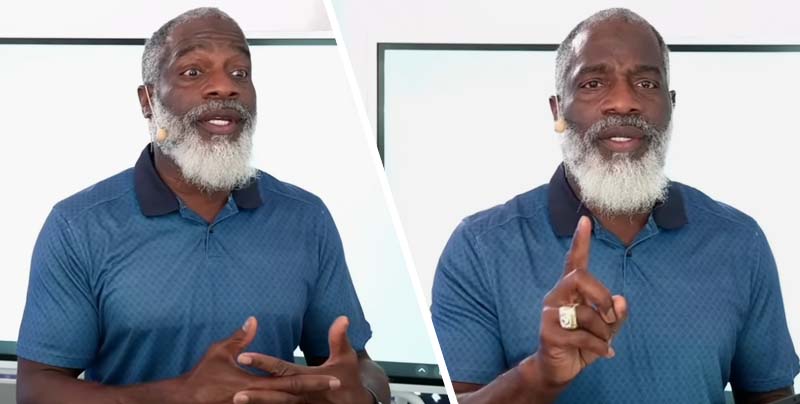Myron Golden shares his discovery of financial principles that took him nearly 40 years to learn, emphasizing the stark economic disparities in America. He highlights that only a small percentage achieve financial success, while the majority struggle. Golden criticizes the traditional education system for its failure to teach practical financial knowledge and argues that miseducation leads to financial failure. He advocates for adopting the habits of the wealthy, such as owning a business and continuously educating oneself, rather than following the majority’s path of employment and entertainment. Golden’s “two-sentence wealth formula” advises to emulate the top 5% of income earners and avoid the practices of the bottom 95%, stressing the importance of planning and proactive financial education to achieve success.
Understanding the Financial Landscape
Before diving into the principles of financial mastery, it’s essential to assess where you are and where you want to be. Understanding the current economic disparities is crucial. According to various statistical organizations, including the Social Security Administration, the top 20% of income earners in America make 49.1% of all income, while the bottom 20% earn only 3.6%. This stark contrast highlights the challenges many face in achieving financial stability.
The Struggle of Modern Families
In today’s economy, it’s common to see both parents working multiple jobs just to make ends meet. This wasn’t always the case. Decades ago, one parent working was often enough to support a family. Now, even with everyone in the family working, many still struggle financially. The problem isn’t a lack of opportunity; it’s a result of a flawed financial plan.

Statistics That Matter
Let’s look at the Doty economic tables, which tracked 100 people from age 20 to 65. The findings are eye-opening: out of 100 people, only one becomes rich, four become financially independent, five are still working at age 65, 28 are dead, and 62 are dead broke. This means 62% of Americans end up with nothing after a lifetime of work.
The 5% Versus the 95%
Only 5% of people achieve financial independence in the wealthiest country in the world. This means 95% fail. These numbers should motivate you to take action. The odds may seem stacked against you, but with the right strategies, you can join the top 5%.
Developing a Financial Plan
Having a plan for achieving financial goals is crucial. Most people think that just wanting to succeed is enough. However, hope and desire alone won’t get you there. A concrete plan is necessary. Let’s look at what successful people do differently.
The Power of Education
Education plays a critical role in financial success, but not the traditional kind. The current education system often misguides us, training us to conform rather than think critically. From a young age, we’re told to get good grades, go to college, and secure a good job. But this plan doesn’t guarantee financial security.

Breaking Free from Traditional Education
Traditional education often fails to teach practical financial skills. Many of us memorize information without understanding its real-world application. To achieve financial success, learning how money works and adopting the habits of wealthy individuals is essential.
Contrarian Thinking
Being part of the top 5% requires thinking differently from the majority. While most people follow a conventional path, you need to be a contrarian. This means questioning traditional advice and seeking out new ways to grow your wealth.
The Two-Sentence Wealth Formula
Here’s the simple yet profound wealth formula: Find out what the top 5% do and do the same thing. Conversely, find out what the bottom 95% do and avoid those practices. This approach can dramatically change your financial trajectory.
Adopting the Right Attitude
Rich people have an “I can” attitude, focusing on possibilities. In contrast, poor people often say, “I can’t,” focusing on limitations. This mindset difference is crucial. By believing in your ability to succeed and seeking solutions, you can overcome obstacles.
Owning a Business
80% of wealthy individuals own their own businesses. Owning a business allows you to create jobs and build wealth. If you don’t have a business, now is the time to start thinking about potential ventures.
The Importance of Continuous Learning
Rich people invest in their education through books, seminars, and programs. They prioritize learning over entertainment. By dedicating time to self-improvement, increasing knowledge and skills, leading to greater financial success is possible.
Maximizing Tax Breaks
Rich people benefit from tax breaks that poor and middle-class individuals don’t. Understanding and utilizing these tax advantages can significantly impact your financial situation.
The Impact of Compound Interest
Albert Einstein called compound interest the most powerful force in the universe. Understanding and using compound interest is essential for building wealth. Any financial principle not understood or used is likely being used against you.

The Four Ways to Earn Income
- Have a Job (HAJ): This is the most common and least effective way to earn money. You’re trading time for money, and there are no tax breaks.
- Own a Job (OAJ): Being self-employed means making more money but having less time. You might earn more, but you’re still trading time for money.
- Own a System (OAS): This involves owning a business system or franchise that generates income without constant presence. It’s a pathway to massive wealth.
- Sow Money Seeds (SMS): Investing money wisely to create significant returns. This includes understanding and leveraging compound interest.
The Path to Financial Independence
To achieve financial independence, focus on owning a system and investing wisely. Learn from the top 5%, adopt their habits, and avoid the pitfalls that keep the bottom 95% from succeeding.
Taking Action
Are you ready to transform your financial future? Start by adopting the habits of the wealthy. Invest in education, think outside the box, and develop a concrete financial plan. Remember, the more effort put into the financial journey, the more will be gained.
FAQs
What is Mind Over Money Mastery?
Mind Over Money Mastery is a comprehensive course designed to teach the principles of financial success, helping adopt the mindset and habits of wealthy individuals.
Who is Myron Golden?
Myron Golden is a financial expert who shares valuable lessons he learned over nearly 40 years to help others achieve financial independence.
How can one join the top 5%?
By adopting the habits and strategies of the wealthy, such as continuous learning, owning a business, and understanding compound interest, one can significantly improve their financial situation.
Why is traditional education not enough?
Traditional education often fails to teach practical financial skills, focusing instead on memorization and conformity. To succeed financially, one needs to learn how money works and think critically.
What are the benefits of owning a business?
Owning a business allows for the creation of wealth, enjoying tax breaks, and building a system that generates income without constant presence.
How can someone start investing with limited funds?
Start small and be consistent. Look for low-cost investment options such as index funds or ETFs. As more knowledge and confidence are gained, diversifying investments and increasing contributions is possible.
What are the best ways to continue learning about personal finance?
Reading books, attending seminars, taking online courses, and seeking mentorship from financial experts are excellent ways to continue financial education. Always stay curious and open to new information.
Exploring Different Investment Options
When it comes to investing, diversifying your portfolio is key. This means spreading your investments across various asset classes to minimize risk. Here are some common investment options to consider:
- Stocks: Buying shares of companies gives partial ownership and the potential to earn returns through dividends and capital appreciation.
- Bonds: These are debt securities issued by governments or corporations. They provide regular interest payments and are generally considered safer than stocks.
- Real Estate: Investing in property can generate rental income and appreciate over time. Real estate can be a solid long-term investment.
- Mutual Funds: These funds pool money from many investors to buy a diversified portfolio of stocks, bonds, or other securities. They offer professional managementand diversification.
- Exchange-Traded Funds (ETFs): Similar to mutual funds, ETFs are traded on stock exchanges and offer diversification and flexibility.
- Retirement Accounts: Contributing to retirement accounts like 401(k)s and IRAs can provide tax advantages and help save for the future.
- Cryptocurrency: Digital currencies like Bitcoin and Ethereum have gained popularity as alternative investments. They can be highly volatile but offer significant growth potential.
Starting Your Investment Journey
Begin by setting clear investment goals. Determine your risk tolerance and time horizon, and then choose investments that align with these factors. It’s essential to do research and consider seeking advice from financial professionals to make informed decisions.
Understanding the Importance of Budgeting
Budgeting is a fundamental aspect of financial management. It helps track income and expenses, ensuring living within means and saving for future goals. A well-planned budget can prevent overspending and help build a solid financial foundation.
Steps to Create an Effective Budget
- Track Income and Expenses: Record all sources of income and categorize expenses to understand spending habits.
- Set Financial Goals: Define short-term and long-term financial goals, such as saving for a vacation, paying off debt, or building an emergency fund.
- Create a Spending Plan: Allocate income to different categories, including essentials, discretionary spending, savings, and investments.
- Monitor and Adjust: Regularly review the budget to ensure staying on track. Make adjustments as needed to stay aligned with goals.
Building and Maintaining Good Credit
Credit score is a critical component of financial health. It affects the ability to secure loans, rent an apartment, and even get a job. Building and maintaining good credit requires responsible financial behavior and understanding how credit works.
Tips for Improving Credit Score
- Pay Bills on Time: Late payments can significantly impact the credit score. Set up reminders or automatic payments to ensure bills are paid on time.
- Keep Credit Card Balances Low: Aim to use less than 30% of available credit. High balances can negatively affect the credit score.
- Diversify Credit Types: Having a mix of credit accounts, such as credit cards, loans, and mortgages, can positively impact the score.
- Limit New Credit Inquiries: Applying for too much new credit in a short period can lower the score. Be selective about new credit applications.
- Monitor Credit Report: Regularly check the credit report for errors and dispute any inaccuracies.
Smart Strategies for Debt Management
Managing debt effectively is crucial for financial stability. High levels of debt can hinder the ability to save and invest. Implementing smart debt management strategies can help regain control of finances.
Effective Debt Management Techniques
- Create a Debt Repayment Plan: List all debts and prioritize them based on interest rates and balances. Focus on paying off high-interest debt first.
- Consider Debt Consolidation: Consolidating multiple debts into a single loan with a lower interest rate can simplify repayment and reduce interest costs.
- Negotiate with Creditors: If struggling to make payments, reach out to creditors to discuss potential payment plans or settlements.
- Avoid Accumulating New Debt: Limit the use of credit cards and avoid taking on new loans while working to pay off existing debt.
- Seek Professional Help: If the debt situation is overwhelming, consider consulting a credit counselor or financial advisor for guidance.
Achieving Financial Independence
Financial independence means having enough income to cover living expenses without relying on traditional employment. It allows living on one’s terms and pursuing passions. Achieving financial independence requires disciplined saving, investing, and strategic planning.
Steps to Achieve Financial Independence
- Start Early: The sooner saving and investing begin, the more time the money has to grow through compound interest.
- Save Aggressively: Aim to save a significant portion of income. The higher the savings rate, the faster financial independence can be achieved.
- Invest Wisely: Focus on investments that offer growth potential and align with risk tolerance and financial goals.
- Minimize Expenses: Live below means and find ways to reduce unnecessary expenses. This will increase savings and investment capacity.
- Build Passive Income Streams: Develop multiple streams of passive income, such as rental properties, dividends, or royalties, to support financial independence.

Final Thoughts
Mastering finances is a journey that requires dedication, education, and strategic planning. By adopting the principles of the Mind Over Money Mastery course, financial futures can be transformed, and the independence desired can be achieved. Start today by visiting MyronGoldenLive.com to learn more and take the first step towards financial mastery.
“`

